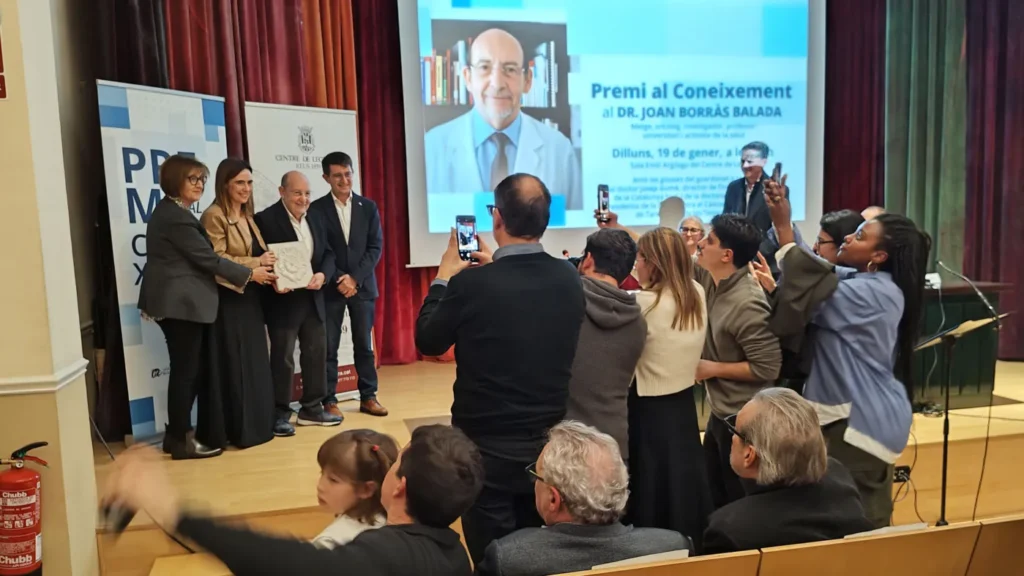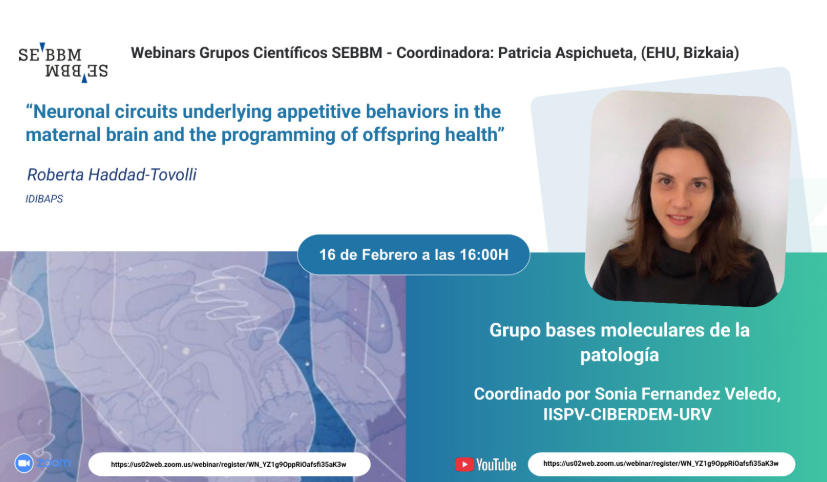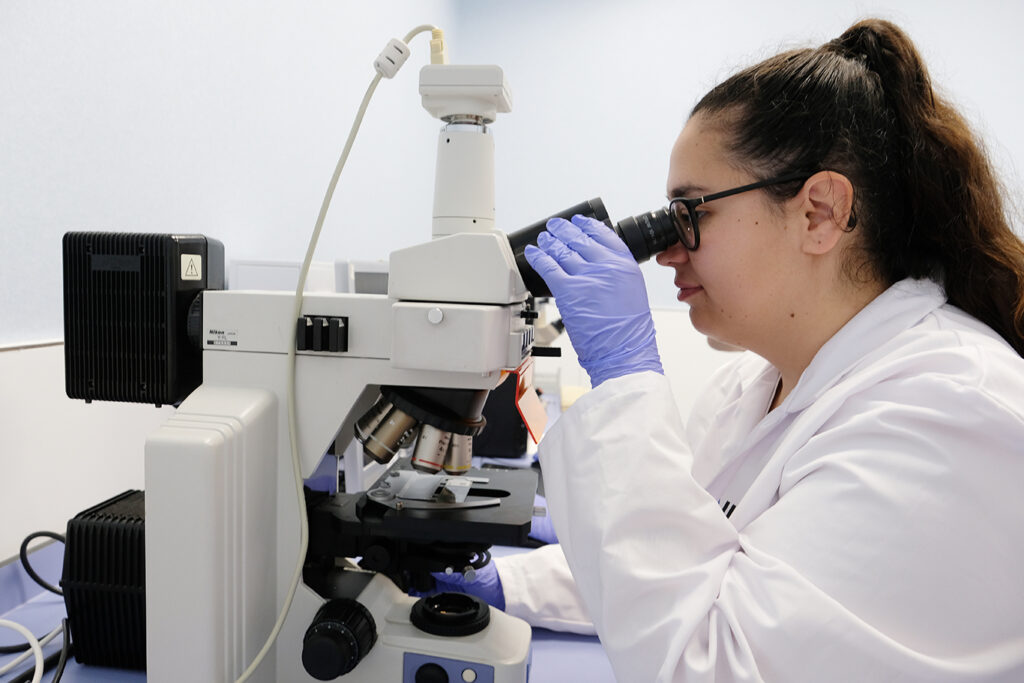A study from URV, with participation from IISPV, compares abdominal ultrasound with magnetic resonance imaging and shows the potential of this technique to detect early risk of prediabetes and metabolic syndrome in people with abdominal obesity
The distribution of body fat, especially the fat accumulated in the abdomen, is a key factor in the risk of developing metabolic and cardiovascular diseases. However, not all abdominal fat has the same impact on health: subcutaneous fat, located under the skin, does not carry the same risks as visceral fat, which is stored deeper and can come into direct contact with vital organs. Identifying which type of fat is more predominant in a person is essential to assess metabolic risk and to guide clinical interventions. In this context, a study led by researchers from the Department of Medicine and Surgery at the Universitat Rovira i Virgili (URV), with the participation of research staff from the IISPV, analysed how useful and reliable abdominal ultrasound can be for measuring visceral fat, compared with magnetic resonance imaging, which is currently considered the reference technique.
In clinical practice, the risk associated with abdominal fat is usually assessed by measuring waist circumference. However, this simple method is limited because it cannot distinguish between subcutaneous and visceral fat. Imaging techniques such as magnetic resonance imaging or computed tomography provide this information with high accuracy, but they are expensive, require specialised equipment, and are not easily available in primary care. To explore more accessible alternatives, the research team aimed to validate the use of abdominal ultrasound to characterise fat distribution. “Ultrasound is available in most primary care centres and hospitals, and with trained health professionals it allows real-time imaging at a very low cost,” explains Claudia Jiménez-ten Hoevel, researcher at the Department of Medicine and Surgery at the URV and co-author of the article.
The key question was how similar the results of ultrasound could be to those of magnetic resonance imaging when analysing abdominal fat. To answer this, the team worked with a sample of 113 adult volunteers with abdominal obesity, living in Reus and nearby areas. All participants underwent both a magnetic resonance imaging scan and an abdominal ultrasound within a short period —between three and four days— to ensure comparable results.
A valid and accurate tool
The results of the study, published in Diabetes, Obesity and Metabolism, show that visceral fat measurements obtained through ultrasound had good agreement with those obtained through magnetic resonance imaging. However, the researchers also found some limitations of ultrasound when measuring subcutaneous fat, something that previous studies had already suggested. “The main conclusion is that ultrasound can be especially useful when the goal is to identify visceral fat, which is the type most clearly linked to metabolic risk,” says Anna Pedret, researcher from the same department. This potential adds to the fact that ultrasound is easy to use for trained staff and is available in most health centres.
Visceral fat: an indicator of metabolic risk
The analysis also allowed the researchers to explore whether the amount of visceral fat measured by ultrasound could predict future metabolic problems. The results show a relationship between high levels of visceral fat and the presence of prediabetes —a condition where blood sugar levels are high but still below the threshold for type 2 diabetes— as well as metabolic syndrome —a group of risk factors that increase the likelihood of cardiovascular disease.
More specifically, the study identifies a level of visceral fat above which the risk of associated diseases increases significantly. For example, a thickness of 7.35 centimetres or more is linked to a higher risk of prediabetes, while from 5.77 centimetres there is a relationship with the probability of metabolic syndrome. These findings highlight the potential of ultrasound as an exploratory tool: “Including abdominal ultrasound in routine clinical practice, especially in nutrition and primary care, could improve risk assessment and allow more personalised interventions,” the researchers explain.
The research group Nutrició Funcional, Oxidació i Malalties Cardiovasculars (NFOC-SALUT) from the URV and the Institut d’Investigació Sanitària Pere Virgili (IISPV) continues working to promote the use of ultrasound as an affordable, fast, and easily applicable technique in clinical practice. The team is now studying the impact of abdominal fat distribution in other population groups and its relationship with different health conditions, such as cognitive function or sarcopenia. In this context, the group is carrying out new studies using abdominal ultrasound in people aged 60 to 74, with ongoing research and open participation. Interested individuals can contact the team at estudisalimentacionfocsalut@gmail.com.
Bibliographic reference: Jiménez-Ten Hoevel C, Besora-Moreno M, Queral J, Llauradó E, Valls RM, Solà R, Pedret A. Ultrasound and MRI abdominal fat distribution and its associations with metabolic conditions in adults with abdominal obesity. Diabetes Obes Metab. 2025 Dec 17. DOI: 10.1111/dom.70390. Epub ahead of print. PMID: 41403258.
The Institut d’Investigació Sanitària Pere Virgili (IISPV) celebrates the recognition given to Dr Joan Borràs Balada, deputy director of the Oncology Institute of Southern Catalonia and researcher linked to our institute, who has recently received the 2026 Knowledge Prize from the City Council of Reus.



In Spain, 17,241 sudden cardiac deaths are recorded every year
The incidence of sudden cardiac death (SCD) in the Mediterranean area is one third lower than in countries in northern Europe and America. This is the conclusion of a study co‑led by the Pere Virgili Health Research Institute (IISPV) and the Catalan Medical Emergency System (SEM), with the participation of the Institute of Legal Medicine and Forensic Sciences of Catalonia (IMLCFC), Joan XXIII University Hospital of Tarragona, Sant Joan University Hospital of Reus, Xarxa Santa Tecla, IDIAP Jordi Gol, Rovira i Virgili University, and the Catalan Health Institute. The study, recently published in the international journal BMJ Global Health, analyses the factors that explain the lower impact of sudden cardiac death in the Mediterranean region.
According to the study (Epidemiology of sudden cardiac arrest in the western Mediterranean area based on a prospective registry), 70% of sudden deaths are caused by cardiac conditions. Chronic coronary disease is identified as the main cause of sudden death, followed by acute coronary disease and cardiomyopathies. In addition, 15% of sudden deaths are due to non‑cardiac cardiovascular causes, such as pulmonary thromboembolism or intracranial haemorrhage. The remaining 15% are related to non‑cardiovascular causes, such as digestive bleeding or infections. Alfredo Bardají, cardiologist at Joan XXIII University Hospital, highlights that “this study found that acute myocardial infarction as a cause of sudden cardiac death is decreasing, thanks to improvements in early treatment”.
Regarding the possible prevention of sudden death, Youcef Azeli, principal investigator of the study, SEM doctor, physician at Sant Joan University Hospital of Reus and head of the IISPV research group in emergencies, explains that “only one third of patients have a previous history of heart disease, which makes prediction difficult. Also, in 50% of cases, cardiac arrest occurs without previous symptoms, which makes treatment harder”. Even so, the study shows that one in five patients had a medical consultation in the four weeks before the event, which highlights the need to work on medium‑term prevention strategies to improve the detection of patients at risk.
This research is also relevant for two additional reasons. First, it involved up to six institutions, which made it possible to gather information from many different sources. In this regard, the participation of the Institute of Legal Medicine and Forensic Sciences of Catalonia (IMLCFC), part of the Department of Justice and Democratic Quality, is especially important. Its director, Eneko Barbería, points out that “including forensic analyses and data allows us to obtain a complete picture of sudden cardiac death and makes this study unique in the Mediterranean area and in Europe”.
Second, this is the first study that provides real data on the incidence of sudden death in Catalonia and Spain, thanks to the wide participation of institutions that contributed information. According to the Catalonia Cardiac Arrest and Sudden Death Registry (RAIMCAT), 2,700 cases are recorded every year in Catalonia and initially attended by SEM, which means 7 cases per day. In Spain as a whole, the annual number is 17,241 cases, or 47 cases per day. This study, unique in Europe, shows that sudden cardiac death is one of the most important causes of death in Spain, just after lung cancer.
The survival rate after sudden cardiac arrest is only 10%. Cases with previous chest pain or where an automated external defibrillator (AED) is used before SEM arrives have a better chance of survival. For this reason, in the presence of warning signs such as chest pain, or when witnessing a sudden loss of consciousness, it is essential to recognise the situation quickly, start high‑quality chest compressions, and use an AED as soon as possible.
This study, funded by the Catalan Resuscitation Council (CCR), has made it possible to identify the cause of death in a higher percentage of cases than other published studies. Research like this, with high‑quality registries on sudden cardiac death, helps advance precision medicine, prevention, and treatments that improve patient care.
Reference: Azeli, Y., Barbería, E., Solà-Muñoz, S., Landín, I., Fernández, A., Rey-Reñones, C., García-Gual, C., Gomez-Tortosa, A., Granado-Font, E., Fernandez-Sender, L., García-Vilana, S., Bonet, G., Jimènez-Fàbrega, X., & Bardaji, A. (2025). Epidemiology of sudden cardiac arrest in the western Mediterranean area based on a prospective registry. BMJ global health, 10(11), e020462. https://doi.org/10.1136/bmjgh-2025-020462
This tool gathers detailed nutritional information on 850 products from 42 brands available in the main supermarkets in Spain. Its aim is to provide dietetics, nutrition, paediatrics and other health professionals with a reliable and updated source of information about the composition of these foods. This allows them to accurately assess nutrition during the first years of life and offer recommendations that promote a healthier and more sustainable diet. In addition, the results can serve as a basis for designing more effective food and regulatory policies.
According to Nancy Babio, researcher at the Human Nutrition Unit of the URV and coordinator of the project, “this database is a key step to provide health professionals with objective and evidence‑based information, in a context where the offer of commercial products for young children is growing quickly and does not always follow public health criteria”.
The results of the analysis, published in the scientific journal European Journal of Pediatrics, show worrying data. Besides confirming that only 20% of the products analysed meet all the nutritional profile and advertising criteria recommended by the WHO, it also warns that 60% of the food contains excessive amounts of sugar, and 99% of fruit purées would require a “high in sugar” warning label. In fact, none of the foods analysed should be advertised according to WHO guidelines.
The analysis also shows that 30% of the products include added sugars or sweeteners, such as honey or concentrated juices, and that none of the products meet all the WHO criteria for commercial promotion. Moreover, 98% display unauthorised claims or promotional messages.
“These results highlight the urgent need to improve regulation, both in the formulation and in the advertising of foods aimed at young children. At the moment, this is governed by a co‑regulation code (PAOS) that is not legally binding and has not worked as expected,” warns Roser Martí, president of CODINUCAT.
The Baby & Toddler Food Composition Database – InfantBase is a tool designed both for professional use and for political decision‑making.
This tool is part of the PRINUT project (Early Childhood: Nutritional Analysis and Regulation of Commercial Foods), which is aligned with public health strategies aimed at promoting healthy and safe eating during early childhood, following WHO recommendations and the PAAS (Comprehensive Plan for Health Promotion through Physical Activity and Healthy Eating) of the Government of Catalonia.
“As scientists and health professionals, we believe we have the responsibility to translate scientific evidence into effective policies that protect children’s health. We hope to receive institutional support to move forward in this direction,” concludes Babio.
The GEMMAIR research group received the Joan Pedrerol Gallego Award for the Social Impact of Research from the Social Council of the Universitat Rovira i Virgili last Thursday, 6 November. The award corresponds to the 2025 edition, in the field of health and life sciences, ex ante category.
The winning project, titled “Bisphenol A and liver health: Impact of a BPA‑free diet on Metabolic Dysfunction‑Associated Steatotic Liver Disease”, was presented by researchers Maria Teresa Auguet Quintillà, Helena Clavero Mestres, Carmen Aguilar Crespillo, José Antonio Porras, David Riesco, Salomé Martínez, Margarita Vives and Fàtima Sabench Pereferrer.
Succipro, a spin-off created in 2022 as a result of research from IRB CatSud (the new name that the current IISPV will adopt from 2026), has joined the business and innovation platform Catalonia.health. This step will help the company connect with other organisations in the Catalan biomedical sector, create synergies, share knowledge and speed up the development of its products.
Succipro focuses on developing new therapeutic strategies based on succinate modulation, with the aim of addressing inflammatory and metabolic diseases that affect millions of people. All of this is explained in this video.
At the moment, Succipro is developing a drug for the treatment of Inflammatory Bowel Disease (IBD). It is currently in the preclinical phase and shows very promising initial results. Succipro’s drugs also have the potential to treat other complex diseases of high clinical relevance, such as diabetes or certain types of cancer, where inflammation and metabolism play an important role.
At Succipro, the team works every day to improve the quality of life of people living with these conditions. The company is strongly committed to developing therapies that address real and personalised problems in patients. This approach follows the principles of personalised medicine, designing molecules with proper scientific and methodological validation to solve problems that are not yet fully addressed.
For Succipro, joining Catalonia.health is a “strategic decision that will allow the company to build connections with other organisations in the Catalan biomedical sector”. This collaboration is expected to help create synergies, share knowledge and accelerate the development of its products. This link between science, business and health is seen as essential to position Catalonia as an international reference in biomedicine.
More information: https://www.succipro.com/ https://www.iispv.cat/
The project is supported by the Diputació de Tarragona, which has granted funding of 100,000 euros to carry out the initiative

The Pere Virgili Health Research Institute (IISPV) — which from 2026 will become the Southern Catalonia Biomedical Research Institute (IRB CatSud) — is leading the XISS project to integrate biomedical research and social innovation. The aim of the project is to transform the province’s healthcare system by creating effective connections between biomedical research, technological innovation, and citizen participation, with a direct impact on people’s health and well‑being. This initiative is carried out with the collaboration of the Diputació de Tarragona, which has provided a grant of €100,000 to support its development.
The project has enabled the preliminary studies for the creation of the Southern Catalonia Clinical Research Unit (UiC), which will be located at Sant Joan University Hospital in Reus and coordinated together with the three health regions (Camp de Tarragona, Terres de l’Ebre, and Baix Penedès). This infrastructure will make it possible to develop advanced clinical trials, including phase I oncology studies, as well as multicentre research on cardiovascular, metabolic, infectious, and neurodegenerative diseases.
The UiC will make it easier for patients from rural or geographically dispersed areas to take part in studies, reducing inequalities and increasing access to therapeutic innovation. In addition, data interoperability and the implementation of telemedicine services will ensure equal opportunities in access to clinical trials.
The project covers 184 municipalities and 10 counties in the province of Tarragona, involving local and socioeconomic stakeholders (city councils, hospitals, primary care centres, the university, civil society, patient associations, biotechnology and pharmaceutical companies, business clusters, and start‑ups).
Among the results already achieved are:
An analysis of the Spanish Clinical Studies Registry shows that the province of Tarragona has a much lower concentration of clinical trials than Barcelona (21.89 per million inhabitants compared to 114.89). The XISS project addresses this need by ensuring a more balanced distribution of resources and clinical research structures across Catalonia.
The XISS project positions itself as a national reference in translating scientific knowledge into clinical practice, promoting a healthcare system focused on people, the territory, and the reduction of social and geographical inequalities.

A study has identified, for the first time, non-invasive biomarkers able to detect early stages of hepatic steatosis — also known as fatty liver — in children and adolescents who acquired the Human Immunodeficiency Virus (HIV) at birth. The study, published in Communications Medicine, was coordinated by researchers from the CIBER area of Infectious Diseases (CIBERINFEC) at the Joan XXIII University Hospital of Tarragona – Pere Virgili Health Research Institute (IISPV), and the La Paz University Hospital. The team also included members from Rovira i Virgili University (URV), the La Paz Research Institute (IdiPAZ), and the Autonomous University of Madrid (UAM). This work represents an important step forward in improving the diagnosis of a complication that affects around 30% of this pediatric population.

De izqda. a dcha.: Talía Talía Sainz, Anna Rull y Silvia Chafino.
Hepatic steatosis is common in people living with HIV, and its prevalence among children and young people is also close to 30%. However, non-invasive diagnostic methods used in adults do not work properly in pediatric patients. “Until now, we lacked reliable tools to detect fatty liver in young people with HIV without using invasive techniques. It was essential to find specific biomarkers that could identify the disease in its earliest stages,” explained Anna Rull and Talía Sainz, CIBERINFEC researchers from Joan XXIII University Hospital – IISPV and La Paz Hospital, who led the study.
This study used advanced metabolomic techniques to analyze blood and stool samples from 29 participants, examining circulating fats, bile acids, and intestinal bacteria. This approach allowed the detection of very precise metabolic changes that may indicate liver damage even before symptoms appear.
Among all the molecules studied, two types of triglycerides (TG54:5 and TG56:7) and the bile acid UDCA stood out for their ability to distinguish young people with hepatic steatosis from those without the disease. “The combination of triglyceride TG56:7 and bile acid UDCA greatly improved the ability to separate the two groups,” said Silvia Chafino, CIBERINFEC researcher and first author of the study.
The study also showed that total triglycerides, usually used in adults to evaluate liver function, did not show significant differences between groups in this pediatric cohort. This highlights the importance of exploring specific triglycerides.
The intestinal microbiota was also examined, given its role in transforming bile acids. Although no differences were found between groups, positive correlations were observed between UDCA and the bacterium Collinsella, known to produce this bile acid. This may explain the trends observed, according to the research team.
Finally, the integrated analysis of bile acid profiles identified a subgroup within the control population that showed a pattern similar to children with hepatic steatosis. The researchers emphasized that these results “suggest that early changes in bile acid levels may reflect an initial pathological state, even before clear clinical signs appear. This underlines their promising role in predicting hepatic steatosis, although their possible clinical use should be explored in more detail.”
Article reference: Chafino S, Tarancon-Diez L, Hurtado-Gallego J, Flores-Piñas M, Alcolea S, Olveira A, et al. Metabolomics for searching non-invasive biomarkers of metabolic dysfunction-associated steatotic liver disease in youth with vertical HIV. Commun Med. 2025;5:433.
A study led by the Universitat Rovira i Virgili has followed more than one thousand individuals with overweight or obesity and other metabolic indicators, such as hypertension or elevated glucose and cholesterol levels, over a six-year period.
Sarcopenic obesity—defined as the combination of excess body fat with low muscle mass and strength—is a risk factor for cognitive decline in older adults. This is the conclusion of a longitudinal study conducted by researchers from the Universitat Rovira i Virgili (URV) and the CatSud Biomedical Research Institute, in collaboration with other groups from the Biomedical Research Networking Centre (CIBER).
The investigation monitored 1,097 participants aged between 55 and 75 years who presented overweight or obesity and metabolic syndrome—a cluster of risk factors for heart disease and diabetes, including hypertension, high cholesterol, or elevated blood glucose. The research team examined whether individuals with sarcopenic obesity at baseline were more likely to experience deterioration in different domains of cognitive function, assessed periodically through standardized neuropsychological tests.
The Combination of Sarcopenia and Obesity: A Key Driver of Cognitive Decline
The findings reveal that participants with sarcopenic obesity experienced a greater decline in overall cognitive function after six years and showed an increased risk of subtle cognitive impairment, an early stage preceding mild cognitive impairment. By contrast, neither obesity alone nor isolated sarcopenia were associated with poorer cognitive performance, suggesting that the combination of both conditions may be responsible for a more detrimental impact on brain health.
“Ageing with an unfavourable body composition may have deeper implications than we previously thought,” explains Héctor Vázquez-Lorente, researcher at the URV Department of Biochemistry and Biotechnology and first author of the study. “Our data show that sarcopenic obesity can accelerate cognitive decline even before clinical symptoms appear,” he adds.
According to Jordi Salas-Salvadó, Professor of Nutrition at URV, ICREA Academia researcher, and senior author of the article, these results highlight the importance of early detection: “Identifying sarcopenic obesity in older adults could be crucial for anticipating cognitive trajectories and enabling early interventions that help prevent future cases of dementia.”
Public Health Implications
Sarcopenic obesity is particularly relevant in contexts with ageing populations, high levels of sedentary behaviour, and a growing prevalence of obesity. Detecting it in clinical practice could facilitate more effective interventions during the initial stages of cognitive decline: “Understanding how body composition influences brain health is essential for designing strategies to slow down age-related decline,” notes Salas-Salvadó. Furthermore, he stresses that the findings “reinforce the need to promote a healthy lifestyle that combines physical activity, balanced nutrition, and control of excess body fat to curb the rise of sarcopenic obesity.”
Reference: Vázquez-Lorente H, Paz-Graniel I, Margara-Escudero HJ, Martínez-González MÁ, Romaguera D, Urbistondo DM, Estruch R, Sánchez VM, Vidal J, Fitó M, Goñi N, Chaplin A, Zulet MA, Sacanella E, de Paz Fernández JA, Altés A, García-Gavilán JF, Konieczna J, Martínez JA, Salas-Salvadó J. Sarcopenic Obesity and Longitudinal Trajectories on Cognitive Performance and Subtle Cognitive Impairment Over 6 Years in Older Adults. J Cachexia Sarcopenia Muscle. 2025 Dec;16(6):e70158. doi: 10.1002/jcsm.70158. PMID: 41361860.